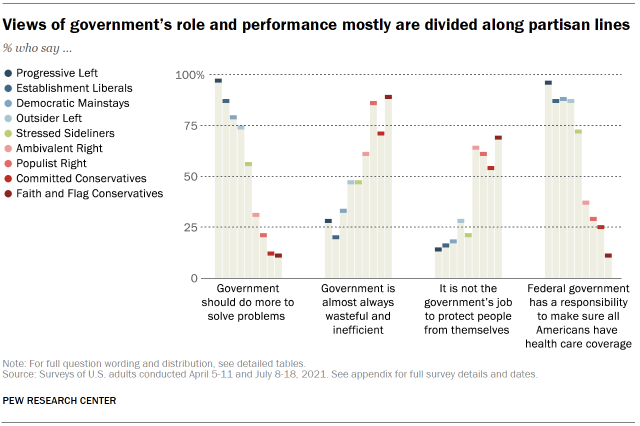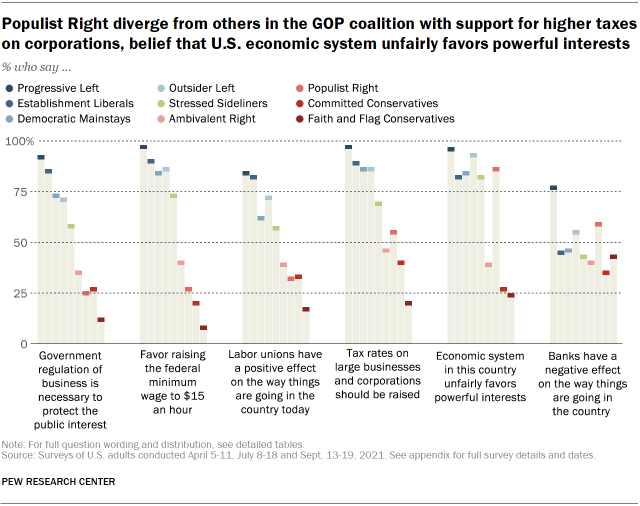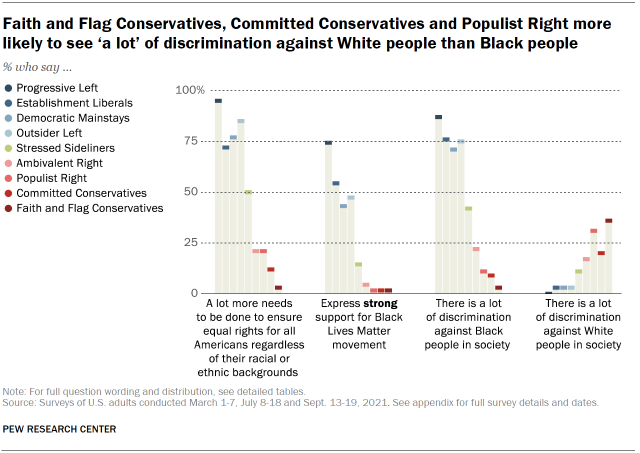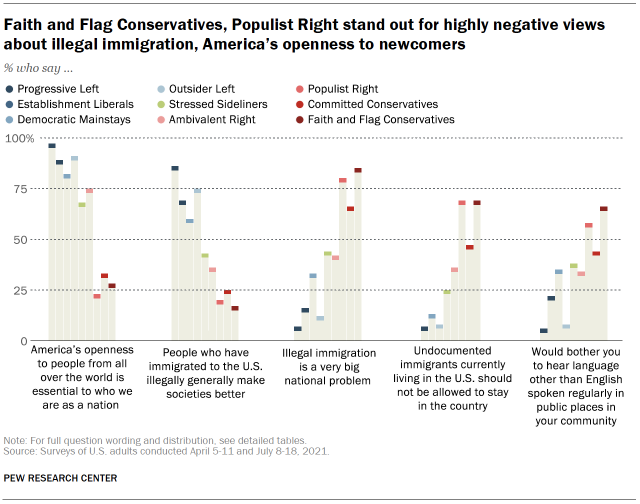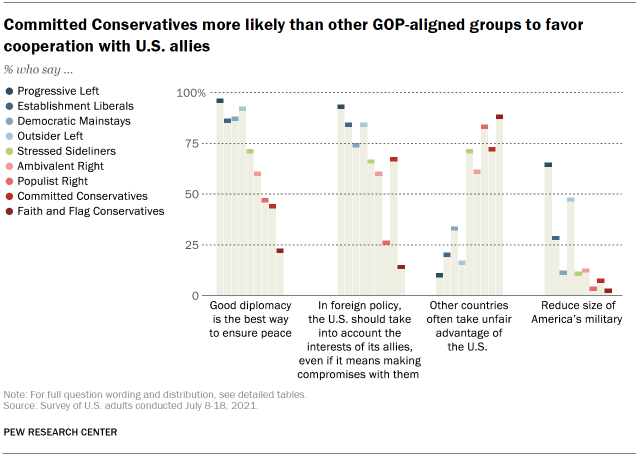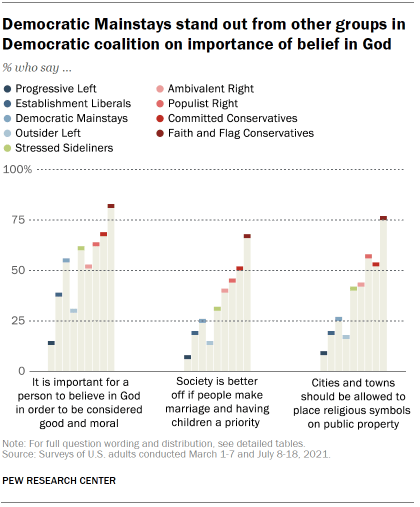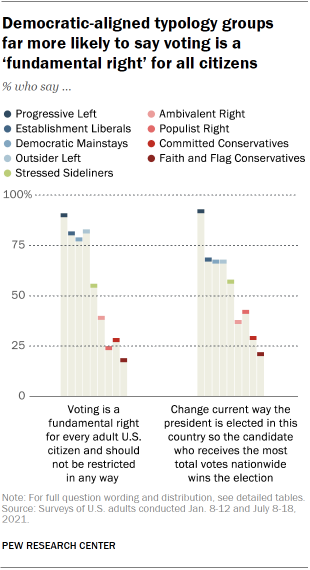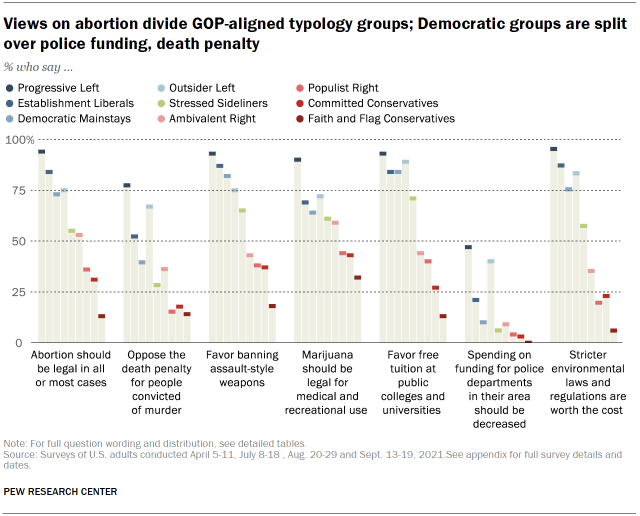On nearly every issue – including the economy, role of government, voting and elections, race and immigration policy – there are differences in opinions among the nine groups in the political typology. While most differences break down along partisan lines, the typology also reveals several issues where there are notable cleavages within the partisan coalitions, not simply between them.
This generally is not the case when it comes to opinions about the size and scope of government; on these issues, there are wide differences between Republicans and Democrats, but relatively modest differences within each partisan coalition. Sizable majorities in the Democratic-oriented typology groups say that the government should do more to solve problems and that it has a responsibility to make sure all Americans have health coverage. Democrats also widely reject the view that “it is not the government’s job to protect people from themselves.” Note: For full question wording and distribution on each question, see detailed tables.
Republican-oriented groups largely say it is not the government’s job to protect people from themselves and that it should not do more to solve problems. Majorities across GOP-aligned groups also say the government does not have a responsibility to provide health coverage, although nearly four-in-ten Ambivalent Right (38%) say it has this responsibility.
In views of government performance, majorities across Republican-oriented groups say government is “almost always wasteful and inefficient.” Democratic-oriented groups mostly take the opposite view, that government “often does a better job than people give it credit for.” However, nearly half of Outsider Left (48%) say government is almost always inefficient, the highest among Democratic groups. Note: For full question wording and distribution on each question, see detailed tables.
Within the GOP, divides over the fairness of the economic system
The Republican coalition generally has a conservative outlook on taxes, the impact of large corporations and the fairness of the U.S. economic system, with one notable exception: On several issues, the views of Populist Right are closer to Democratic-aligned groups than to other Republican groups.
An overwhelming share of Populist Right (87%) say the U.S. economic system unfairly favors powerful interests; that is more than 40 percentage points higher than any other GOP-aligned group. And Populist Right is the only Republican-oriented group in which a majority (56%) favors raising tax rates on large businesses and corporations.
Republican groups are more in agreement with their negative opinions of labor unions. In this case, however, Faith and Flag Conservatives stand out for their highly critical view (80% say labor unions have a negative impact on the way things are going in the country).
In general, when it comes to economic issues, Democratic-oriented groups are largely united in their skepticism toward corporate power and the fairness of the U.S. economic system. Overwhelming shares in all Democratic-oriented groups say that tax rates on large businesses and corporations, as well as on household incomes over $400,000, should be raised. The Democratic coalition – especially Progressive Left and Establishment Liberals – also express very positive views of unions and broadly support for raising the federal minimum wage to $15 an hour.
While Stressed Sideliners have more mixed views of business and labor than those of partisan typology groups, a large share (83%) say that the economic system in this country unfairly favors powerful interests – an attitude that more closely aligns with views expressed by those in Democratic-oriented groups. Similarly, a 58% majority say labor unions have a positive effect on the way things are going in the country. Note: For full question wording and distribution on each question, see detailed tables.
Views on race underscore deep partisan divisions, intraparty differences
Perhaps no issue area highlights the deep divide between the partisan coalitions – and within them – more clearly than attitudes about race and racial justice.
Among Democratic-oriented groups, Progressive Left stand out for their firm belief that a lot more needs to be done to ensure equal rights for all, regardless of race or ethnicity, and that Black people face a lot of discrimination, as well as for their strong support of the Black Lives Matter movement.
Conversely, Faith and Flag Conservatives diverge from Democratic groups – and other Republican-aligned groups – with their attitudes on race. For example, while small shares across Republican groups say there is a lot of discrimination against Black people, only 4% of Faith and Flag Conservatives say this; far more say there is only a little discrimination (40%), or no discrimination at all (14%), against Black people. As a point of comparison, 88% of Progressive Left see a great deal of discrimination against Black people, highest among all typology groups.
Faith and Flag Conservatives are one of three GOP-aligned groups in which significantly larger shares say there is a lot of discrimination against White people than Black people. Ambivalent Right are about as likely to see a lot of discrimination against Black people as White people. Among Democratic-aligned groups – as well as Stressed Sideliners – much larger shares see a lot of discrimination against Black people. Note: For full question wording and distribution on each question, see detailed tables.
Differences within both partisan coalitions in views of immigration
Opinions on immigration – like views on race – are mostly divided along partisan lines, though there also are differences within the coalitions.
Among Democratic-aligned groups, majorities say that the nation’s openness to people from all over the world is essential to who we are as a nation and that people who have immigrated illegally generally make their communities better. Yet Democratic Mainstays are more likely than other Democratic groups to say illegal immigration is a very big national problem; a slightly larger share of Democratic Mainstays also say it would bother them to hear a language other than English spoken in their community.
Immigration attitudes are also one of the key areas that distinguish Faith and Flag Conservatives and Populist Right from other Republican groups. Both hold particularly negative views of immigrants and their impacts on the country.
At least eight-in-ten in each group say that illegal immigration is a very big national problem – and sizable shares in both say that the number of legal immigrants admitted to the U.S. should be reduced. Moreover, nearly half of Populist Right (48%) say that White people declining as a share of the U.S. population is bad for society, the highest share of any political typology group. Note: For full question wording and distribution on each question, see detailed tables.
Divisions among GOP-oriented groups on cooperation with U.S. allies
In views of foreign policy, there are illuminating divides among Republican groups, particularly when it comes to U.S. cooperation with key allies. Committed Conservatives stand out for their view that the U.S. should consider its allies’ interests – a view that is more closely aligned with some Democratic groups than with those on the right.
Nearly seven-in-ten Committed Conservatives (68%) say the U.S. should take into account the interests of key allies, even if it means making compromises with them. That is somewhat higher than Ambivalent Right – and much higher than the other two conservative groups in the typology, Faith and Flag Conservatives and Populist Right.
Republican-oriented typology groups also are divided over the Reagan-era approach of “peace through strength.” A sizable majority of Faith and Flag conservatives (75%) say the best way to ensure peace is through military strength, as do at least half of Committed Conservatives and Populist Right. But only about four-in-ten Ambivalent Right agree, with a majority (61%) saying peace is better secured through good diplomacy.
While Democratic groups mostly view diplomacy as the best way to secure peace and favor U.S. cooperation with allies, they differ over the optimal size of the U.S. military. Sizable shares of Progressive Left (65%) and Outsider Left (48%) say that the size of America’s military should be reduced. This compares with just 29% of Establishment Liberals and 12% of Democratic Mainstays. Note: For full question wording and distribution on each question, see detailed tables.
Most Faith and Flag Conservatives say belief in God is essential for morality
Faith and Flag Conservatives are considerably more religious than other typology groups, including other groups on the right. For example, they are only typology group in which a majority say practicing their faith is very important to them personally.
This is reflected in other attitudes of Faith and Flag Conservatives toward religion and whether religion should influence government policy.
A sizable majority (83%) says it is important for a person to believe in God in order to be good and moral; a similar majority also says that cities and towns should be able to display religious symbols in public places. Other Republican-oriented groups stress the importance of religious values, but to a lesser degree.
Faith and Flag Conservatives also place a particular emphasis on traditional family structures: About two-thirds (68%) say society is better off if people make marriage and having children a priority. They also are the only political typology group in which a majority say government policies should support religious values and beliefs.
On the left, Democratic Mainstays stand out from the other left-oriented groups for the importance they place on belief in God: They are the only Democratic group for which a majority (56%) say it is essential or important for a person to believe in God in order to be considered good and moral.
In a very different way, Progressive Left also have distinctive views on religion. Nearly three-quarters (74%) say it is not important at all to believe in God in order to be considered good and moral. And they are more likely than other typology groups to say the decline in the share of Americans belonging to an organized religion is good for society (51%). Note: For full question wording and distribution on each question, see detailed tables.
Deep divides between partisan coalitions on access to voting
In the wake of the contested 2020 election, views on voting access have become deeply partisan issues.
This is reflected in the opinions of political typology groups: Sizable majorities in all four Democratic-oriented groups view voting as a fundamental right for all citizens that should not be restricted; fewer than half of those in Republican-aligned groups say the same.
There are comparable differences between the partisan coalitions on whether everything possible should be done to make it easy to vote and in support for such policies as mail voting and automatic voter registration.
However, there is less consensus on changing the current system for electing presidents in the U.S.: A near-unanimous majority of Progressive Left say the country should change the current way the president is elected so that the candidate who receives the most total votes nationwide wins the election. Establishment Liberals, Democratic Mainstays and Outsider Left are more divided. Note: For full question wording and distribution on each question, see detailed tables.
How typology groups view other issues: Abortion, gun policies, marijuana, police funding and the environment
On several other key issues that are prominent in politics, there are meaningful divisions within the Democratic and Republican coalitions – particularly when it comes to abortion, the death penalty and police funding.
On several issues, like climate change and gun policies, there are familiar partisan divides. But other issues break the traditional partisan mold. For example, Ambivalent Right stand against other Republican-oriented groups in their majority view that abortion should be legal in all or most cases, and their view that marijuana should be legal for medical and recreational use. They also are more likely than their Republican counterparts to oppose the death penalty for people convicted of murder and to say that stricter environmental laws and regulations are worth the cost.
There also are several issues that distinguish Democratic groups from each other. Progressive Left and Outsider Left are both more likely than other Democratic-oriented groups to say they oppose the death penalty and that spending on funding for police departments should be decreased.
Progressive Left are particularly likely to take strong liberal stances on a number of social issues and policies. Near-unanimous majorities in this group say abortion should be legal in all or most cases; that stricter environmental laws and regulations are worth the cost; and that marijuana should be legal for medical and recreational use. Other Democratic groups also generally support these measures, but less consistently than Progressive Left.
Stressed Sideliners hold a mix of views on many social issues, but on abortion, banning assault style weapons, favoring legal marijuana and making public tuition free at colleges and universities, they are more aligned with Democrats than with Republicans. However, they are less likely to oppose the death penalty than those on the left – and are considerably less likely than these groups to say spending on funding for police departments in their area should be decreased. Note: For full question wording and distribution on each question, see detailed tables.
